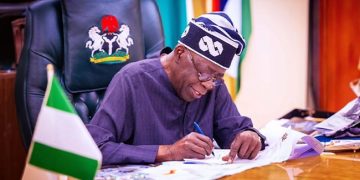Guns, Gold, and the Global Game: Why Africa Must Rewrite the Rules Before It’s Too Late

By Dr. Michael Omoruyi | iNewsAfrica
For centuries, the world’s balance of power has been tilted in favor of those who possess two things: money and guns. Western nations did not dominate by accident—they built vast fortunes through industrial revolutions, colonial exploits, and global trade dominance, then defended their interests with superior military technology.
Meanwhile, China, India, and Africa were systematically exploited, stripped of resources, and left with limited economic and military might. But history never stands still. The global power pendulum is swinging. China and India are rising rapidly. Africa, however, remains stuck in a cycle of poverty and dependency that could leave it permanently sidelined if urgent action is not taken.
China and India’s Climb
China has transformed from a war-torn, famine-stricken nation into a global manufacturing powerhouse, investing heavily in technology, infrastructure, and a formidable military. India, once synonymous with colonial exploitation, is now a leader in IT services, pharmaceuticals, and space technology. Both nations understood that wealth creation and strategic defense go hand in hand in shaping global influence.
Africa’s Unfinished Business
Africa, rich in natural resources but poor in capital and industrial capacity, continues to export raw materials at bargain prices while importing finished goods at premium costs. This colonial-era trade pattern drains wealth and keeps the continent dependent on external powers. Militarily, African nations remain fragmented and often reliant on foreign defense aid.
Why the Balance Hasn’t Shifted for Africa
Economic Fragmentation – 54 countries with uneven policies and weak intra-African trade links.
Overreliance on Extractives – Gold, oil, and minerals are exported without local value addition.
Military Dependence – Foreign nations still lead peacekeeping and defense initiatives on African soil.
Leadership Deficits – Corruption and short-term political thinking undermine long-term strategies.
The Path to Power
If Africa is to join China and India in reshaping global power, it must:
-
Industrialize Aggressively – Process raw materials locally to create jobs, wealth, and global competitiveness.
-
Invest in Strategic Defense – Build capable, collaborative defense systems to secure resources and sovereignty.
-
Leverage the African Continental Free Trade Area (AfCFTA) – Strengthen internal trade and economic integration.
-
Champion Innovation – Invest in AI, clean energy, and future industries to leapfrog outdated economic models.
-
Unite Politically and Economically – Speak with one voice on the global stage to negotiate better terms in trade and diplomacy.
The history of global power teaches a brutal truth: those without economic might and strategic defense remain at the mercy of those who have both. China and India have understood this lesson and acted upon it. Africa’s time to act is now—not tomorrow, not next decade.
The future will not be shaped by pity for the poor but by respect for the powerful. If Africa continues to delay, the balance of power will shift without us—and we will once again be spectators in a game where we should be players.
About the Author
Dr. Michael Omoruyi is a Technologist, Educator, and the Author of “From Grit to Grace: A Memoir of Roots, Resilience, and Reinvention.” He currently serves as Director of Diaspora Affairs for the LPPMC and advocates for youth inclusion and African innovation.

Leave a reply Cancel reply
Popular Categories
- Mauritania 1
- Nepal 1
- Culture 1
- Trade 1
- Ivory Coast 1
- ICJ 1
- Somali 1
- Europe 1
- United Nations 1
- Israel 1
- Thailand 1
- Zimbabwe 1
- West Africa 1
- Brazil 1
- Finland 1
- Colombia 1
- Travel 1
- Automobile 1
- Myanmar 1
- Entertainment 1
- Mozambique 1
- Morocco 1
- Space 1
- Terrorism 1
- Tunisia 1
- Book & Arts Spotlight 1
- Vatican City 1
- ECCAS 1
- senegal 1
- UNDP 1
- The Hague 1
- Vietnam 1
- Gambia 1
- Global Diplomacy 1
- Wildlife 1
- Celebration 1
- Interview 1
- BRICS 1
- Democracy 1
- Defense 1
- Gabon 1
- Pakistan 1
- Togo 1
- Weather 1
- Algeria 2
- Church 2
- Economy 2
- Rome 2
- Energy 2
- New York City 2
- Science 2
- Guinea-Bissau 2
- Somalia 2
- Zambia 2
- Angola 2
- World Bank 2
- Middle East 2
- Benin Republic 2
- Cameroon 2
- London 2
- Education 2
- Sierra Leone 2
- Business 2
- Chad 2
- Caribbean 2
- Ukraine 2
- Ukraine 2
- Haiti 2
- Guinea 2
- India 3
- Russia 3
- South Sudan 3
- Uganda 3
- Crime 3
- Namibia 3
- Music 3
- Ethiopia 3
- Transportation 3
- Rwanda 3
- France 3
- Lesotho 3
- Aviation 3
- Congo 3
- Health 4
- Tanzania 4
- Liberia 4
- Libya 5
- ECOWAS 5
- Egypt 5
- UN 5
- UK 6
- Mali 7
- China 7
- Niger 8
- Editorial 8
- Sudan 9
- Burkina Faso 10
- Politics 11
- Tech 12
- Ghana 13
- Technology and Business 13
- DR Congo 15
- World 15
- Sports 17
- Kenya 17
- Opinion 18
- People 23
- South Africa 29
- US 47
- OP-ED 62
- Africa 85
- Nigeria 158

Email: [email protected]
Must Read
-
Nigeria: Time to tame monster of open grazing
March 31, 2025










